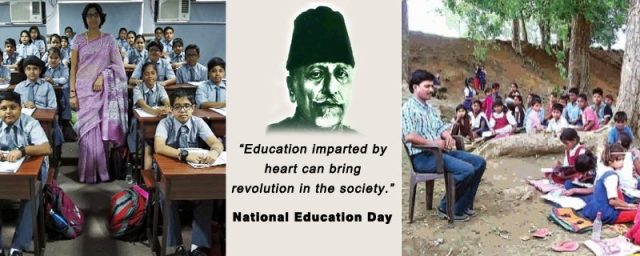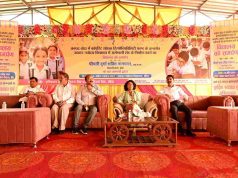National Education Day – Hopes & Aspirations
Today, India celebrates National Education Day to commemorate the birth anniversary of Maulana Abdul Kalam Azad, independent India’s first education minister.
His contribution as the education minister from 15th August 1947 until 2nd February 1958 is hardly spoken about. November 11 every year is an annual observance of his efforts for shaping up the education system in India by his strong advocacy for free and compulsory education for children, vocational training and technical education. He firmly believed that no programme of national education could be appropriate if it did not incorporate advancement and education of women. He established important organisations like Indian Institute of Technology (IIT), University Grants Commission (UGC).
Though celebrations to observe the day are held across the country, many of his dreams await materialisation. According to Census 2011, the literacy rate in India was 74.04%. The gender-gap in education is clearly seen with only 65.46% females being literate compared to 82.14% males.
The Right to Education (RTE) Act, 2009 was introduced to provide free and compulsory education to children irrespective of caste, gender, and social background. This helped in improving the enrollment of many out of school children in public schools. While the enrollment improved infrastructure and quality of education imparted still remains a challenge.
Kruti Bharucha, Country Head, ARK (a non profit organisation working towards providing access to quality education for children globally) commenting on the state of public education said, “India as a nation is losing out on enormous potential with millions of kids out of school. The problem is no longer lack of access but rather, lack of quality in public schools.”
Global Competitiveness Report 2016-17 pointed that India improved its ranking from 55th of 144 countries to 39th out of 138 countries. The country, however, still lagged behind when it came to health and primary education ranking at 85th out of 144 countries.
While government is making efforts to provide free & compulsory education the impact is yet to be seen. Instances show schools having three different grade classes being run simultaneously by one teacher in one classroom. Schools without toilets, professional teachers and other basic amenities are still witnessed in the country in abundant numbers.
Drawbacks in primary education create an uphill task for the future generation of the country. Shashi Tharoor, former Union Minister for Human Resource in one of his speeches had mentioned, “64% of employers are not satisfied with the quality of graduates they’re getting. Some companies are running, essentially, re-education programmes, to make up for the deficiencies of what they’ve learned or not properly learned in the college.”
In 2010, India spent 3.3% of gross domestic product (GDP) on education while global average was 4.9% according to data published by World Bank. Talking about reforms Bharucha added, “With such poor learning outcomes, there is an urgent need to reform India’s education system. The cost of not investing in children today is tremendous, not only to their life chances but to the economic future of the entire country.”
There is a need for systematic approach towards enhancing the state of education in the country. With challenges like infrastructure, availability of professionals, value-based learning, standardisation and modernisation of curriculum, lot needs to be done. With many corporate firms, non-profits coming forward for public-private-partnership (PPP) there is some positive change. But the gap between requirements and availability of such setup is yet sizeable. To take advantage of its demographic dividend, each citizen needs to be provided with access to quality education.
Thank you for reading the story until the very end. We appreciate the time you have given us. In addition, your thoughts and inputs will genuinely make a difference to us. Please do drop in a line and help us do better.
Regards,
The CSR Journal Team













